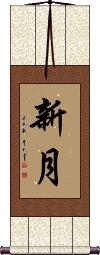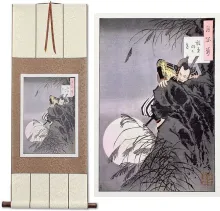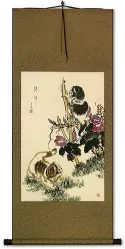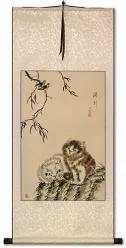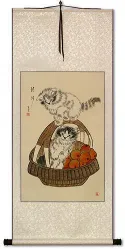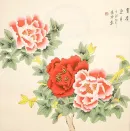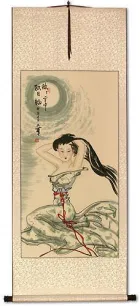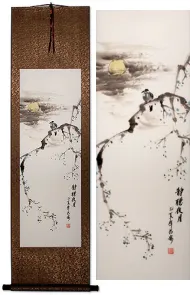Many custom options...
And formats...

Not what you want?
Try other similar-meaning words, fewer words, or just one word.
Feel free to email me with your request. If it's easy, I'll translate it for free and add it to this database of calligraphy for you.
New Moon in Chinese / Japanese...
Buy a New Moon calligraphy wall scroll here!
Personalize your custom “New Moon” project by clicking the button next to your favorite “New Moon” title below...
New Moon
Broken Mirror Rejoined
Used in modern times for divorced couples that come back together
破鏡重圓 is about a husband and wife who were separated and reunited.
About 1500 years ago in China, there lived a beautiful princess named Le Chang. She and her husband Xu De Yan loved each other very much. But when the army of the Sui Dynasty was about to attack their kingdom, disposed of all of their worldly possessions and prepared to flee into exile.
They knew that in the chaos, they might lose track of each other, so the one possession they kept was a bronze mirror which is a symbol of unity for a husband and wife. They broke the mirror into two pieces, and each of them kept half of the mirror. They decided that if separated, they would try to meet at the fair during the 15th day of the first lunar month (which is the lantern festival). Unfortunately, the occupation was brutal, and the princess was forced to become the mistress of the new commissioner of the territory, Yang Su.
At the Lantern Festival the next year, the husband came to the fair to search for his wife. He carried with him his half of the mirror. As he walked through the fair, he saw the other half of the mirror for sale at a junk market by a servant of the commissioner. The husband recognized his wife's half of the mirror immediately, and tears rolled down his face as he was told by the servant about the bitter and loveless life that the princess had endured.
As his tears dripped onto the mirror, the husband scratched a poem into his wife's half of the mirror:
You left me with the severed mirror,
The mirror has returned, but absent are you,
As I gaze in the mirror, I seek your face,
I see the moon, but as for you, I see not a trace.
The servant brought the inscribed half of the mirror back to the princess. For many days, the princess could not stop crying when she found that her husband was alive and still loved her.
Commissioner Yang Su, becoming aware of this saga, realized that he could never obtain the princess's love. He sent for the husband and allowed them to reunite.
This proverb, 破鏡重圓, is now used to describe a couple who has been torn apart for some reason (usually divorce) but have come back together (or remarried).
It seems to be more common these days in America for divorced couples to reconcile and get married to each other again. This will be a great gift if you know someone who is about to remarry their ex.
This in-stock artwork might be what you are looking for, and ships right away...
Gallery Price: $108.00
Your Price: $59.88
Gallery Price: $72.00
Your Price: $39.88
Gallery Price: $72.00
Your Price: $39.88
Gallery Price: $200.00
Your Price: $88.88
Gallery Price: $232.00
Your Price: $128.88
Gallery Price: $90.00
Your Price: $49.88
Gallery Price: $126.00
Your Price: $69.88
Gallery Price: $126.00
Your Price: $69.88
Gallery Price: $126.00
Your Price: $69.88
Not the results for New Moon that you were looking for?
Below are some entries from our dictionary that may match your New Moon search...
| Characters If shown, 2nd row is Simp. Chinese |
Pronunciation Romanization |
Simple Dictionary Definition |
新月 see styles |
xīn yuè xin1 yue4 hsin yüeh wakatsuki わかつき |
More info & calligraphy: New Moon(1) new moon; first day of the lunar month; (2) (See 三日月) crescent moon; (female given name) Wakatsuki |
朔 see styles |
shuò shuo4 shuo hajime はじめ |
beginning; first day of lunar month; north (1) {astron} new moon; (2) first day of the lunar month; (3) (hist) next year's calendar and decrees (in ancient China; distributed by the Emperor at year's end); (given name) Hajime |
初月 see styles |
hazuki はづき |
(1) (しょげつ, はつづき only) (See 睦月・1) first month of the lunar calendar; (2) (しょげつ only) first month; (3) first moon of the month; new moon; (female given name) Hazuki |
布薩 布萨 see styles |
bù sà bu4 sa4 pu sa fusatsu |
poṣadha, upavasatha, upoṣana; 布沙他 (or 布灑他); 褒沙陀 Pali: uposatha; fasting, a fast, the nurturing or renewal of vows, intp. by 淨住 or 善宿 or 長養, meaning abiding in retreat for spiritual refreshment. There are other similar terms, e. g. 布薩陀婆; 優補陀婆; also 布薩犍度 which the Vinaya uses for the meeting place; 鉢囉帝提舍耶寐 pratideśanīya, is self-examination and public confession during the fast. It is also an old Indian fast. Buddha's monks should meet at the new and fall moons and read the Prātimokṣa sutra for their moral edification, also disciples at home should observe the six fast days and the eight commands. The 布薩日 fast days are the 15th and 29th or 30th of the moon. |
旦望 see styles |
dàn wàng dan4 wang4 tan wang tanmō |
The new moon and full moon, or first, and fifteenth of the moon. |
月眉 see styles |
yuè méi yue4 mei2 yüeh mei gatsumi |
New moon eyebrows, i. e. arched like the Buddha's. |
月缺 see styles |
yuè quē yue4 que1 yüeh ch`üeh yüeh chüeh |
new moon |
月齢 see styles |
getsurei / getsure げつれい |
(1) age of the Moon; number of days since the new moon; (2) age in months (e.g. of an infant) |
朔月 see styles |
shuò yuè shuo4 yue4 shuo yüeh |
new moon; first day of the lunar month |
朔望 see styles |
shuò wàng shuo4 wang4 shuo wang sakubou / sakubo さくぼう |
the new moon; the first day of the lunar month (1) first and fifteenth days of the lunar month (corresponding to new moon and full moon); (2) {astron} syzygy |
四齋日 四斋日 see styles |
sì zhāi rì si4 zhai1 ri4 ssu chai jih shi sainichi |
The four fast days, i. e. at the quarters of the moon— new, full 8th, and 23rd. |
月の剣 see styles |
tsukinotsurugi つきのつるぎ |
(poetic term) (archaism) new moon; crescent moon |
朔望潮 see styles |
shuò wàng cháo shuo4 wang4 chao2 shuo wang ch`ao shuo wang chao sakubouchou / sakubocho さくぼうちょう |
spring tide (biggest tide, at new moon or full moon) (rare) (See 大潮) spring tide |
阿目佉 see styles |
ā mù qiā a1 mu4 qia1 a mu ch`ia a mu chia Amokukya |
(阿目佉跋折羅) Amogha, or Amoghavajra, 阿牟伽 (or 阿謨伽 or 阿穆伽) intp. 不空 (不空金剛) a monk from northern India, a follower of the mystic teachings of Samantabhadra. Vajramati 金剛智 is reputed to have founded the Yogācārya or Tantric school in China about A.D. 719-720. Amogha succeeded him in its leadership in 732. From a journey through India and Ceylon, 741-6, he brought to China more than 500 sutras and śāstras; introduced a new form for transliterating Sanskrit and published 108 works. He is credited with the introduction of the Ullambana fesival of All Souls, 15th of 7th moon, v. 盂. He is the chief representative of Buddhist mysticism in China, spreading it widely through the patronage of three successive emperors, Xuanzong, Suzong, who gave him the title of 大廣智三藏 q.v., and Daizong, who gave him the posthumous rank and title of a Minister of State. He died 774. |
三十日月 see styles |
misokazuki みそかづき |
(rare) new moon; lunar phase when the moon is completely invisible |
躲得過初一,躲不過十五 躲得过初一,躲不过十五 |
duǒ de guò chū yī , duǒ bù guò shí wǔ duo3 de5 guo4 chu1 yi1 , duo3 bu4 guo4 shi2 wu3 to te kuo ch`u i , to pu kuo shih wu to te kuo chu i , to pu kuo shih wu |
lit. you may go undetected during the new moon, but at full moon you'll be found out (idiom); fig. you can't put it off forever; sooner or later you'll have to deal with it |
The following table may be helpful for those studying Chinese or Japanese...
| Title | Characters | Romaji (Romanized Japanese) | Various forms of Romanized Chinese | |
| New Moon | 新月 | shingetsu | xīn yuè / xin1 yue4 / xin yue / xinyue | hsin yüeh / hsinyüeh |
| Broken Mirror Rejoined | 破鏡重圓 破镜重圆 | pò jìng chóng yuán po4 jing4 chong2 yuan2 po jing chong yuan pojingchongyuan | p`o ching ch`ung yüan pochingchungyüan po ching chung yüan |
|
| In some entries above you will see that characters have different versions above and below a line. In these cases, the characters above the line are Traditional Chinese, while the ones below are Simplified Chinese. | ||||
Successful Chinese Character and Japanese Kanji calligraphy searches within the last few hours...
